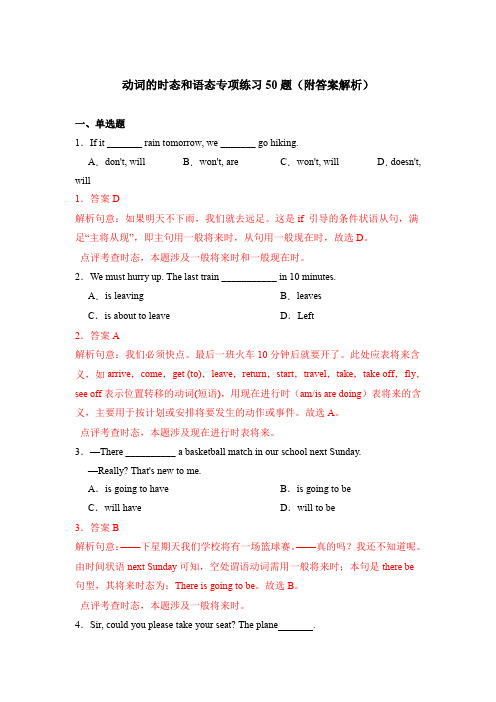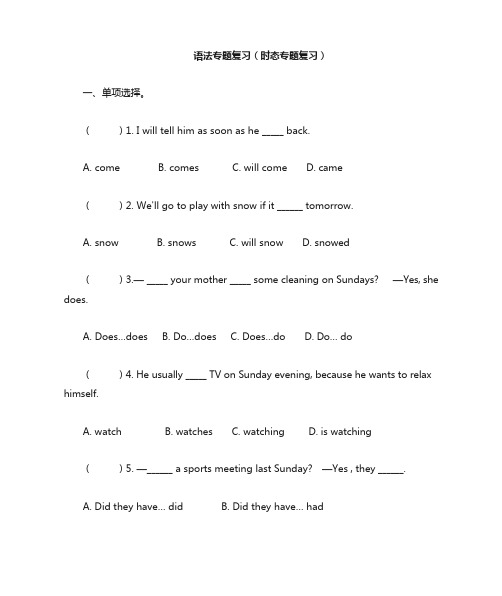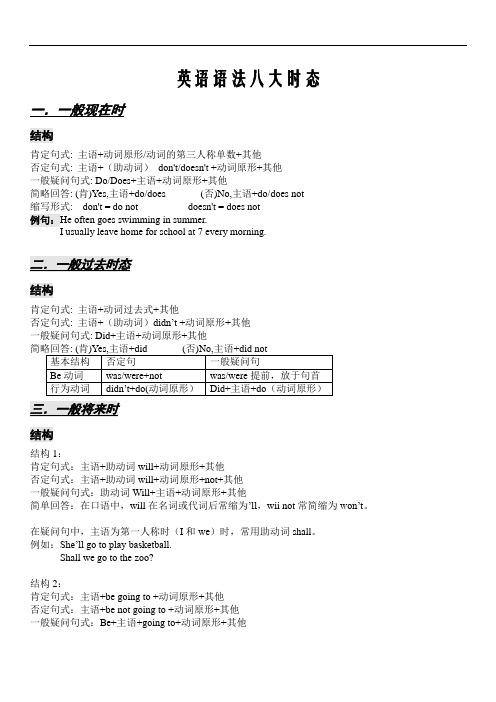初中英语各种时态复习及练习题
初中英语8种时态复习及专题练习

初中英语8种时态复习I.时态详解一、一般现在时:概念:①表现在存在的状态;②现在经常、反复发生的动作。
时间状语:always,usually,often,sometimes,everyweek(day,year,month…),onceaweek,onSund ays,etc.基本结构:①主语+be(am,is,are);②主语+行为动词原型(单三形式主语+动词单三形式)否定形式:①am/is/are+not;(is+not=isn’t;are+not=aren’t)②此时态的谓语动词若为行为动词,则在其前加don't,如主语为第三人称单数,则用doesn't,同时还原行为动词。
一般疑问句:①把be动词放于句首;②用助动词do提问,如主语为第三人称单数,则用does,同时,还原行为动词。
二、一般过去时:概念:①过去某个时间里发生的动作或状态;②过去习惯性、经常性的动作、行为。
时间状语:ago,yesterday,thedaybeforeyesterday,lastweek(year,night,month…),in1989,jus tnow,attheageof5,oneday,longlongago,onceuponatime,etc.基本结构:①主语+be(was,were);②主语+动词过去式否定形式:①was/were+not;(was+not=wasn’t;were+not=weren’t)②在行为动词前加didn't,同时还原行为动词。
一般疑问句:①was或were放于句首;②用助动词did提问,同时还原行为动词。
三、现在进行时:概念:表示现阶段或说话时正在进行的动作及行为。
时间状语:now,look,listen,atthistime,thesedays,etc.基本结构:be(am,is,are)+doing否定形式:be(am,is,are)+not+doing.一般疑问句:把be动词放于句首。
初中英语动词的时态和语态专项练习50题(附答案解析)

动词的时态和语态专项练习50题(附答案解析)一、单选题1.If it _______ rain tomorrow, we _______ go hiking.A.don't, will B.won't, are C.won't, will D.doesn't, will1.答案D解析句意:如果明天不下雨,我们就去远足。
这是if 引导的条件状语从句,满足“主将从现”,即主句用一般将来时,从句用一般现在时,故选D。
点评考查时态,本题涉及一般将来时和一般现在时。
2.We must hurry up. The last train ___________ in 10 minutes.A.is leaving B.leavesC.is about to leave D.Left2.答案A解析句意:我们必须快点。
最后一班火车10分钟后就要开了。
此处应表将来含义,如arrive,come,get (to),leave,return,start,travel,take,take off,fly,see off表示位置转移的动词(),用现在进行时(am/is are doing)表将来的含义,主要用于按计划或安排将要发生的动作或事件。
故选A。
点评考查时态,本题涉及现在进行时表将来。
3.—There __________ a basketball match in our school next Sunday.—Really? That's new to me.A.is going to have B.is going to beC.will have D.will to be3.答案B解析句意:——下星期天我们学校将有一场篮球赛。
——真的吗?我还不知道呢。
由时间状语next Sunday可知,空处谓语动词需用一般将来时;本句是there be句型,其将来时态为:There is going to be。
初中英语时态讲解及练习(全)

时间状语:Tomorrow, next day(week, month, year…),soon, in a few minutes, by…,the day after tomorrow, etc.
否定形式:主语+am/is/are not going to do ; 主语+will/shall not do+其他 一般疑问句:be放于句首;will/shall提到句首。
1.I ____(write, am writing, is writing, are writing) a letter now. 2.Look, it _____(begin, is beginning, am beginning, are beginning) to rain. 3.They ____(study, is studying, am studying, are studying) medicine at the Medical Institute of Chengde these days. 4.He _____(teach, am teaching, is teaching, are teaching) an English lesson at this time.
谓语动词使用过去式形式, 加ed,分为规则和不规则变 化。表示过去经常发生的动 作,也可用“used to do ” 和“would +动词原形”。
1. He____(be, was, were, been) here a moment ago. 2. They ____(be, was, were, been) here just now. 3. The scientists _____(leave, leaves, leaved, left) for America yesterday. 4. Last week we ______(visit, visited ) the Science Museum. 5. When I was a child, I often ____(play, played) football. 6. The students ran out of the classroom as soon as the bell ____(ring, rang, rung).
初中英语八大时态用法详解及真题巩固练习

初中英语八大时态用法详解及真题巩固练习一般现在时1. 概念:经常、反复发生的动作或行为及现在的某种状况。
2. 基本结构:①is/am/are;②do/does否定形式:①am/is/are + not ; ②此时态的谓语动词若为行为动词,则在其前加don't,如主语为第三人称单数,则用doesn't,同时还原行为动词。
3. 一般疑问句:①把 is/am/are 动词放于句首;②用助动词do提问,如主语为第三人称单数,则用does,同时,还原行为动词。
4. 用法:1) 经常性或习惯性的动作,常与表示频度的时间状语连用。
例如:I leave home for school at 7 every morning. 每天早上我七点离开家。
2) 客观真理,客观存在,科学事实。
例如:The earth moves around the sun. 地球绕太阳转动。
Shanghai lies in the east of China. 上海位于中国东部。
3) 表示格言或警句。
例如:Pride goes before a fall. 骄者必败。
注意:此用法如果出现在宾语从句中,即使主句是过去时,从句谓语也要用一般现在时。
例如:I knew that the earth goes around the sun when I was little.我小时候就知道地球绕太阳转。
4) 现在时刻的状态、能力、性格、个性。
例如:I don't want so much. 我不要那么多。
Ann writes good English but does not speak well.安英语写得不错,讲的可不行。
5) 一般现在时表示将来含义a. 下列动词 come, go, arrive, leave, start, begin, return 的一般现在时可以表示将来,主要用来表示在时间上已确定或安排好的事情。
初中英语五个时态专题练习和答案(复习可用)

A. snow
B. snows
C. will snow D. snowed
( does.
)3.— _____ your mother _____ some cleaning on Sundays? —Yes, she
A. Does…does B. Do…does C. Does…do D. Do… do
( )11. You _____ me waiting for two hours. I _____ for you since five.
A. kept…waited
B. have kept…waited
C. kept…have waited D. have kept…have waited
( )12. —Where _____John _____?
6. We_________ (have) a good time in the Summer Palace last Sunday.
7. If it _________________ (not rain) tomorrow, we'll have a football match.
8. Don't forget _____________ (close) the window when you leave the room.
A. got to
B. reached C. arrive in D. reach
( )10. She ______ to school yesterday because of the strong wind and heavy rain.
A. goes B. went C. doesn’t go D. didn’t go
初中英语语法八大时态总结及练习题

英语语法八大时态一.一般现在时结构肯定句式: 主语+动词原形/动词的第三人称单数+其他否定句式: 主语+(助动词)don't/doesn't +动词原形+其他一般疑问句式: Do/Does+主语+动词原形+其他简略回答: (肯)Yes,主语+do/does (否)No,主语+do/does not缩写形式: don't = do not doesn't = does not例句:He often goes swimming in summer.I usually leave home for school at 7 every morning.二.一般过去时态结构肯定句式: 主语+动词过去式+其他否定句式: 主语+(助动词)didn’t +动词原形+其他一般疑问句式: Did+主语+动词原形+其他基本结构否定句一般疑问句Be动词was/were+not was/were提前,放于句首行为动词didn’t+do(动词原形)Did+主语+do(动词原形)三.一般将来时结构结构1:肯定句式:主语+助动词will+动词原形+其他否定句式:主语+助动词will+动词原形+not+其他一般疑问句式:助动词Will+主语+动词原形+其他简单回答:在口语中,will在名词或代词后常缩为’ll,wii not常简缩为won’t。
在疑问句中,主语为第一人称时(I和we)时,常用助动词shall。
例如:She’ll go to play basketball.Shall we go to the zoo?结构2:肯定句式:主语+be going to +动词原形+其他否定句式:主语+be not going to +动词原形+其他一般疑问句式:Be+主语+going to+动词原形+其他简略回答:(肯)Yes,主语+be (否)No,主语+be not将来时其他表示法1)be going to表示将来表示说话人的打算、计划、安排或根据迹象判断必然或很可能发生的事情。
(完整版)初中英语时态综合练习,附答案
(考试时间:90分钟,满分:100分)一、选择题(每题2分,共30分)1. He _______ to the party last night because he was not feeling well.A. didn't goB. doesn't goC. doesn't wentD. didn't went2. By the time you arrive, the movie _______.A. will finishB. will have finishedC. will be finishingD. finishes3. _______ you ever _______ to Japan?A. Did / goB. Have / goneC. Do / goD. Were / going4. I _______ for the bus when it _______ raining.A. wait / startsB. waited / startedC. am waiting / startedD. was waiting / started5. _______ you like some more coffee?A. CouldB. WouldC. ShouldD. Might6. She _______ her homework when her friend _______.A. was doing / calledB. did / has calledC. does / callsD. is doing / calls7. _______ you _______ the book yet?A. Did / readB. Have / readC. Do / readD. Are / reading8. They _______ in the park when it _______.A. play / is rainingB. played / rainedC. are playing / rainsD. were playing / started to rain9. I _______ her for two years before we got married.A. knowB. knewC. have knownD. had known10. _______ you like _______ to the concert with me?A. Do / to goB. Would / goingC. Are / goingD. Will / go二、判断题(每题1分,共20分)1. The past perfect tense is used to describe an action that happened before another past action. (True/False)2. The simple present tense can be used to talk about scheduled future events. (True/False)3. The present perfect continuous tense is used to describe an action that started in the past and is still continuing in the present. (True/False)4. The past continuous tense is used to describe an action that was happening at a specific time in the past. (True/False)6. The simple past tense is used to describe an action that happened and is now finished. (True/False)7. The present continuous tense is used to describe an action that is happening now. (True/False)8. The past perfect continuous tense is used to describe an action that was ongoing before another past action. (True/False)9. The future simple tense is used to talk about spontaneous future decisions. (True/False)10. The present perfect tense is used to describe an action that happened at an unspecified time before now. (True/False)三、填空题(每空1分,共10分)1. I _______ (to eat) dinner when the phone _______ (to ring).2. By next week, she _______ (to finish) her project.3. They _______ (to travel) to London last summer.4. _______ you _______ (to see) the new movie yet?5. He _______ (to study) English for five years.四、简答题(每题10分,共10分)1. Explain the difference between the simple past and the past continuous tense.2. When do we use the present perfect tense?五、综合题(1和2两题7分,3和4两题8分,共30分)1. Read the following conversation and fill in the blanks with the correct form of the verb in brackets.A: _______ you _______ (to see) Tom recently?B: Yes, I _______ (to see) him last week. He _______ (to tell) me about his new job.2. Complete the following sentences using the correct form of the verb in brackets.1. I _______ (to go) to the gym after work.2. She _______ (to have) a meeting at 10 am tomorrow.3. They _______ (to travel) to Paris next month.3. Write a short paragraph (about 5070 words) using at least three different tenses. Topic: "My Typical Day"4. Read the passage and answer the questions.Yesterday, Sarah and her8. 改错题(每题2分,共10分)1. I has finished my homework.2. She didn't went to the party.3. He was watching TV when I called him.4. They have arrived at the airport.5. I didn't saw him yesterday.9. 完形填空题(每题2分,共10分)Once upon a time, there was a little girl named Snow White. She lived in a beautiful castle with her stepmother, the evil queen. The queen was very jealous of Snow White's beauty, so she (1) _______ (to hire) a huntsman to kill her. However, when the huntsman saw Snow White, he couldn't bring himself to harm her. Instead, he (2) _______ (to warn) her and let her escape into the forest.In the forest, Snow White (3) _______ (to find) a small cottage. She (4) _______ (to be) tired and hungry, so she (5)_______ (to go) inside and (6) _______ (to eat) some food. After that, she (7) _______ (to fall) asleep.Meanwhile, the queen (8) _______ (to use) her magicmirror to find out where Snow White (9) _______ (to be). When she (10) _______ (to discover) that Snow White was still alive, she (11) _______ (to make) a poisoned apple that would put Snow White into a deep sleep.The queen (12) _______ (to disguise) herself as an old woman and (13) _______ (to go) to the cottage where Snow White (14) _______ (to live). She (15) _______ (to convince) Snow White to bite the poisoned apple, and soon Snow White (16) _______ (to fall) into a deep sleep.Fortunately, a prince (17) _______ (to pass) the cottage and (18) _______ (to see) Snow White. He (19) _______ (to kiss) her, and she (20) _______ (to wake) up. They (21)_______ (to get) married and (22) _______ (to live) happily ever after.10. 阅读理解题(每题3分,共15分)Read the following passage and answer the questions.Questions:1. What is the Eiffel Tower?2. Where is the Eiffel Tower located?3. Who designed the Eiffel Tower?4. How tall is the Eiffel Tower?5. Why is the Eiffel Tower famous?11. 写作题(每题10分,共10分)Write a short essay (about 100120 words) on the topic "My Favorite Holiday". Include reasons why it is your favorite holiday and describe how you usually celebrate it.12. 翻译题(每题5分,共10分)1. They have been studying English for five years.2. I didn't understand the question, so I asked the teacher for help.13. 听力题(每题2分,共10分)Listen to the recording and answer the questions.1. What did the man do yesterday?2. Where will they go for their vacation?3. Why did she miss the meeting?4. When will the train arrive?5. How long has he been working here?14. 语法填空题(每题2分,共10分)Fill in the blanks with the correct form of the verb in brackets.1. If I (to have) enough money, I (to buy) a new car.2. By the time you arrive, the movie (to finish).3. They (to watch) TV when the phone (to ring).4. He (to be) tired because he (to work) all day.5. I (to meet) her two years ago.15. 口语表达题(每题5分,共10分)1. Describe your favorite book and explain why you like it.2. Talk about a memorable experience you had while traveling.。
初中英语八大时态全套精讲及练习题(附答案)
初中英语八大时态全套精讲及练习题.1 一般现在时的用法1)经常性或习惯性的动作,常与表示频度的时间状语连用。
时间状语: every…, sometimes,ofen,always,usually, twice a week, at…, on SundayI leave home for school at 7 every morning. He watches Tv once a week .2) 客观真理,客观存在,科学事实。
The earth moves around the sun. Shanghai lies in the east of China.3) 表示格言或警句中。
Pride goes before a fall. 骄者必败。
注意:此用法如果出现在宾语从句中,即使主句是过去时,从句谓语也要用一般现在时。
例:Columbus proved that the earth is round..4) 现在时刻的状态、能力、性格、个性。
I don't want so much.Ann Wang writes good English but does not speak well.比较:Now I put the sugar in the cup.I am doing my homework now.第一句用一般现在时,用于操作演示或指导说明的示范性动作,表示言行的瞬间动作。
再如:Now watch me, I switch on the current and stand back.第二句中的now是进行时的标志,表示正在进行的动作的客观状况,所以后句用一般现在时。
二. 构成及变化1、be动词的变化肯定句:主语+be(am,is,are)+其它。
如: I am a boy. 我是一个男孩。
否定句:主语+ be + not +其它。
如:He is not a worker. 他不是工人。
初中英语时态综合复习讲练(含答案)
初中英语时态综合复习1.写出下列时间状语对应的时态。
every…, sometimes,yesterday morning (afternoon, evening…)just now,now,at this/that time 在这/那时yesterday afternoon昨天下午(just)then 那时,当时at nineon Sundaysyesterday, an hour ago,last night (at)this time yesterdaythe other day, in 1982last night (week, month, year…),a moment ago , a week ago, three years ago…句前的look ,listenthose days, the whole morning, from 8:00 to 12:00 last night tomorrow , soon ,next Monday , next year , next weekend , this afternoon , this evening ……already, yet, just, ever, never, beforefor, since, since…agoso far, ever, never, just, yet,up to now, in past years, 典型例题(1) ---Do you know our town at all?---No, this is the first time I ___ here.A. wasB. have beenC. cameD. am coming(1)He said he________me a present unless I_______ in doing the experiment.A. had not given; had not succeededB. would not give; succeedC. will not give; succeedD. would not give; will succeed. this morning, the whole morning, all day yesterday, from nine to ten last evening, when, whileMary ___ a dress when she cut her finger.A. madeB. is makingC. was makingD. makesAs she ___ the newspaper, Granny ___ asleep.A.read;was fallingB. was reading;fellC. was reading;was fallingD. read;fell---- Your phone number again? I ___ quite catch it.---- It's 69568442.A. didn'tB. couldn'tC. don'tD. can't巩固练习:(聪明的你一定能全部做对)1.2.3.4.5.(see)you at four yesterday afternoon?6., her son ____________ (play) outside the room.7.It ________ (begin) to we _____________(work) in the field.8.(go) out. {go out 意为熄灭}9.——------Oh, I ____________ (read) some books on science.10. Girls ___________(dance) boys ____________(sing) at the party.11.--- Did you see Tim just now?--- Yes. He __________ (fish) by the river.the teacher ______ (come) into the classroom, the students __________(laugh)loudly.写出下列时间状语对应的时态。
初中英语八种时态详解及练习
初中英语语法:动词八种时态、被动语态详解练习及答案:一、初中英语被动语态用法小结[1]一、语态概述英语的语态是通过动词形式的变化表现出来的。
英语中有两种语态:主动语态和被动语态。
主动语态表示主语是动作的执行者。
例如:Many people speak Chinese.谓语:speak的动作是由主语many people来执行的.被动语态表示主语是动作的承受者,即行为动作的对象.例如:Chinese is spoken by many people。
英语English是动词speak的承受者。
二、被动语态的构成被动语态由“助动词be+及物动词的过去分词"构成。
人称、数和时态的变化是通过be的变化表现出来的。
现以speak为例说明被动语态在各种时态中的构成.一般现在时:am/is/are+spoken一般过去时:was/were+spoken一般将来时:will/shall be+spoken现在进行时:am/is/are being+spoken过去进行时:was/were being+spoken现在完成时:have/has been+spoken过去完成时:had been + spoken三、被动语态的用法(1)不知道或没有必要说明动作的执行者是谁。
例如:Some new computers were stolen last night.一些新电脑在昨晚被盗了.(不知道电脑是谁偷的)This bridge was founded in 1981。
这座桥竣工于1981年。
(2)强调动作的承受者,而不强调动作的执行者。
例如:The glass was broken by Mike.玻璃杯是迈克打破的。
This book was written by him.这本书是他写的.Your homework must be finished on time.你们的家庭作业必须及时完成。
四、主动语态变被动语态的方法(1)把主动语态的宾语变为被动语态的主语。
- 1、下载文档前请自行甄别文档内容的完整性,平台不提供额外的编辑、内容补充、找答案等附加服务。
- 2、"仅部分预览"的文档,不可在线预览部分如存在完整性等问题,可反馈申请退款(可完整预览的文档不适用该条件!)。
- 3、如文档侵犯您的权益,请联系客服反馈,我们会尽快为您处理(人工客服工作时间:9:00-18:30)。
初中英语时态复习及练习题一、一般现在时1. 定义:表示通常性、规律性、习惯性的状态或者动作(有时间规律发生的事件)的一种时间状态,或.表示主语具备的性格、能力和特征。
(1、现在的状态。
2、经常或习惯性动作。
3、主语所具备的性格和能力。
4、客观真理。
)2.标志:often(经常),usually(通常),sometimes(有时),always(总是),never(从不),on Sundays(在星期天), every day/month/year(每一天/月/年)3.结构:(1)主语+连系动词be(am/is/are)+名词/形容词/数词/介词短语/副词等做表语表状态(包括There be +n. There is a rabbit.)练习: (be) a student. My name_____(be) Tom.2. Where _____(be) my shoes They___(be) here.____(be) the girl with long straight hair I think she ___(be) Kate.4. You and I ___(not be) in Class Six.(be) there a supermarket on the Fifth Avenue Yes, there_____(be).6. ____ her parent tall No, he____.(2)主语(非第三人称单数)+行为动词原形+其他(用助动词do 帮助构成否定句、一般疑问句和特殊疑问)(3)主语(第三人称单数)+行为动词的第三人称单数+其他(用助动词does 帮助构成否定句、一般疑问句和特殊疑问句)行为动词第三人称单数加-s的形式:1.直接加s2. 辅音+y结尾,变y为i加es: study-studies3.以s,x,ch,sh结尾加es watch-watches teach-teaches4.不规则变化have-has do-does go-goes1)His parents _______________(watch) TV every night. 肯定句1) My brother ______________(do) homework every day.2)His parents ______________(not watch) every night.否定句2)My brother_______________(not do)homework every day.3)__________his parents____________(watch) TV every night一般疑问句3)__________ your brother _________ (do) homework every day4. 例句:(1)My mother gives ten Yuan to my sister every week.我妈妈每星期给我妹妹十元钱。
(2)We usually go to school at 7:30. 我们通常7:30上学去。
二、现在进行时1. 定义:表示动作发生的时间是“现在”,动作目前的状态是“正在进行中”。
2. 句型:现在进行时的构成是:主语+be+doing〔现在分词〕形式注:在现在时中,be 要根据人称代词和名词的单复数不同,而分别使用am/is/are.即:I am he/she/it/a rabblt(单数名词)/milk(不可数名词)/Tom(人名)+isyou/we/they/apples(复数名词)/Lucy and Lily(多人)+are注意:be 动词在现在时里算作“助动词”,翻译正在进行时的时候,be不能解释为“是”,否则不通顺。
它只是和现在分词一起构成“进行时”。
3. 常与表示现在的时间状语连用,如now, this week, at this moment 等;或者告诉你一个准确的现在时间,或者用look, listen提醒听者注意正在发生的事。
4. 例句:(1)They are playing basketball now.现在他们正在打篮球。
(2)Listen! She is singing a song.听,她正在唱歌。
练习:1. Jim __________________(take) photos in the park now.2. Jim_________(not take) in the park now.3. _______________Jim____________(take) photos in the park nowYes, he _____. No, he _______.4. Where _________Jim ____________ photos now In the park.三.一般将来时1. 定义:表示将来某一时刻的动作或状态,或将来某一段时间内经常的动作或状态。
2. 句型:(1)will / shall + 动词原形:这种方法一般单纯地表示将来某个时间将要发生的动作或存在的状态。
注:will用于各种人称;shall只用于第一人称。
(2)be going to 动词原形:be going to 相当于一个助动词(其中be有人称和数的变化),与它后面的动词原形一起构成谓语。
用来表示近期将要发生的动作或存在的状态,以及计划、安排、打算要做的事。
3. 常和表示将来的时间状语连用。
如:tomorrow, next week, from now on;in the future 等。
4. 例句:(1)I will / shall go to visit him next week. 下周我将去拜访他。
(2)There is going to be a football match this afternoon.今天下午将有一场足球赛。
四.一般过去时1.一般过去时表示过去某个时间里发生的动作或状态;过去习惯性、经常性的动作、行为;过去主语所具备的能力和性格。
例句:She came to help us in those days.她过去那些天来帮助我们The boy opened his eyes for a moment,looked at the captain,and then died.那男孩把眼睛张开了一会儿,看看船长,然后就去世了。
2.一般过去时常与表示过去的时间状语或从句连用,如:yesterday, last week, in 1993, at that time, during the war, before, a few days ago, when 等等。
注意1:有些句子,虽然没有表示过去确定时间的状语,但实际上是指过去发生的动作或存在的状态的话,也要用过去时,这一点,要特别注意!I didn't know you were in Paris. 我不知道你在巴黎。
因为在说话时,我已经知道你在巴黎了。
这句话指的是说话之前,所以只能用过去时表示。
实际上,这句话暗指:But now I know you are here.注意2:动词的过去式见总结的大表,不要求背,常做练习去掌握它们。
3.基本结构:主语+动词过去式+其他;否定形式:①was/were+not;He was happy yesterday. → He wasn’t happy yesterday.They were happy last week. → __________________________________②在行为动词前加didn't,同时还原动词He had dinner at 7:00 last night. →He didn’t have dinner at 7:00 last night.They played basketball yesterday. →_____________________________________一般疑问句:①Was/Were+主语+其他He was happy yesterday. → Was he happy yesterdayThey were happy last week. → __________________________________②Did+主语+动词原形+其他He had dinner at 7:00 last night. →Did he have dinner at 7:00 last night They played basketball yesterday. →_____________________________________五.情态动词:1.任何主语+can/may/must+动词原形2.主语+ can’t/may not/ mustn’t+动词原形May/Must + 主语+ 动词原形4.疑问词+can/may/must+主语+动词原形练习:We should ________(study) hard.Must I ______(go) to bed now, mumMay I ________(have) a cup of coffeeYou can’t _____(get) up at 9:00.四.非谓语动词(是固定搭配)1. like+ to do不定式/doing动名词to do sth.3. love to do4. would like to do sth.5. enjoy doing sth.6. thanks for doing7. stop doing sth8. let sb. do sth. →Let’ s (Let us) go home.练习:She wants _____(have) a party.Does he like _______(swim)Don’t let her______(go).My parents always ________(enjoy) __________(watch) CCTV.五.祈使句Take a taxi(Take a bus,Take a walk……)Go!Don’ t make noise.六.综合练习:Green ___)_____(be) a worker. Now he _______________(work) in the field.! Who____________ (sing)time _______ your brother usually _________(do) his homeworkcan___________(come) here by bus.5. Who ________(have) a ruler6.Are they___________(clean) the room7.Jack ____(have) a soccer ball, but he ____(not have) a basketball.________(be) from Canada. They can’t ___________(speak) Chinese.11.我们正在吃晚餐。
